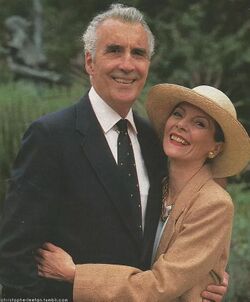Arthur VI
| Arthur VI | |
|---|---|
 | |
| King of the Esthurs | |
| Reign | 22 April, 1947 - present |
| Predecessor | George XI |
| Born | 20 January 1930 Weskerby, Esthursia |
| Spouse | Queen Consort Margrethe (m. 1949; died 2008) |
| Issue | Crown Prince Llywellyn, and 2 others |
| Father | George XI |
| Mother | Edith of Alming |
Arthur VI (Arthur Rickard Walter; born 20 January, 1930) has been King of Esthursia since 22 April, 1947. His reign of over 76 years became the longest of any Esthur monarch in history in Arthur's old age, and one of the world's longest as of May 2023.
Arthur was born in Armston House, Weskerby, as the first child of the Crown Prince (to become George XI) and his wife, Edith of Alming. His father acceded to the throne in 1947, upon the death of his paternal grandfather Edward V, however chose to abdicate, due to a mixture of personal choice and political instability. He was educated privately, and attended the University of Thornlow during his first years on the throne for a Classics degree, which he received with first class honours in 1951. In October 1949, he married Margrethe of Reth, and their marriage lasted 59 years until her death in 2008. They had three children, including Crown Prince Llywellyn.
When his father abdicated in April 1947, Arthur - then just 17 years of age - came to the throne of Esthursia, then known as the Royal Union. Arthur has since reigned as a constitutional monarch through major political changes such as the rule and demise of autocrat Olafn Arbjern, the civil rights movement of the 1950s-60s, three General Strikes, and into the new millennium. As King, Arthur was served by 15 Forethanes.
Significant events included Arthur's coronation in 1948 and the celebrations of his Silver, Golden, Diamond, and First and Second Platinum jubilees in 1977, 2002, 2012, and 2022, respectively. Republicanism in Esthursia slowly returned to the forefront during his latter years, leading to Arthur's decision during his Second Platinum Jubilee of 2022 - in spite of personal popularity - to waive any succession, reduce the scale of the monarchy and prepare it to transition when he dies or abdicates, during the tenure of Harold Osborne, a soft republican.